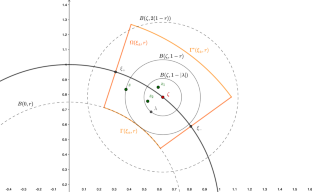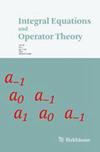On Rate of Convergence for Universality Limits
IF 0.9
3区 数学
Q2 MATHEMATICS
引用次数: 0
Abstract
Given a probability measure \(\mu \) on the unit circle \({\mathbb {T}}\), consider the reproducing kernel \(k_{\mu ,n}(z_1, z_2)\) in the space of polynomials of degree at most \(n-1\) with the \(L^2(\mu )\)–inner product. Let \(u, v \in {\mathbb {C}}\). It is known that under mild assumptions on \(\mu \) near \(\zeta \in \mathbb {T}\), the ratio \(k_{\mu ,n}(\zeta e^{u/n}, \zeta e^{v/n})/k_{\mu ,n}(\zeta , \zeta )\) converges to a universal limit S(u, v) as \(n \rightarrow \infty \). We give an estimate for the rate of this convergence for measures \(\mu \) with finite logarithmic integral.

论普遍性极限的收敛率
给定单位圆\({\mathbb {T}}\)上的概率度量\(\mu \),考虑阶数最多为\(n-1)的多项式空间中具有\(L^2(\mu )\)-内积的再现核\(k_{\mu ,n}(z_1, z_2)\)。让 \(u, v 在 {\mathbb {C}}\).众所周知,在靠近 \(\zeta \in \mathbb {T}\) 的 \(\mu \) 的温和假设下,比率 \(k_\{mu ,n}(\zeta e^{u/n}、\zeta e^{v/n})/k_{\mu ,n}(\zeta , \zeta )\) 收敛到一个普遍的极限 S(u, v) as \(n \rightarrow \infty \)。对于具有有限对数积分的度量 \(\mu \),我们给出了这种收敛速率的估计值。
本文章由计算机程序翻译,如有差异,请以英文原文为准。
求助全文
约1分钟内获得全文
求助全文
来源期刊
CiteScore
1.60
自引率
0.00%
发文量
36
审稿时长
6 months
期刊介绍:
Integral Equations and Operator Theory (IEOT) is devoted to the publication of current research in integral equations, operator theory and related topics with emphasis on the linear aspects of the theory. The journal reports on the full scope of current developments from abstract theory to numerical methods and applications to analysis, physics, mechanics, engineering and others. The journal consists of two sections: a main section consisting of refereed papers and a second consisting of short announcements of important results, open problems, information, etc.

 求助内容:
求助内容: 应助结果提醒方式:
应助结果提醒方式:


